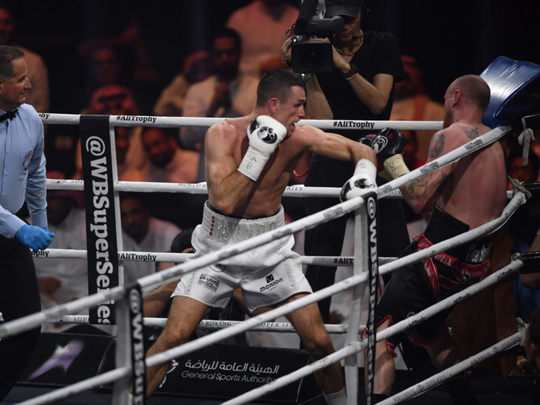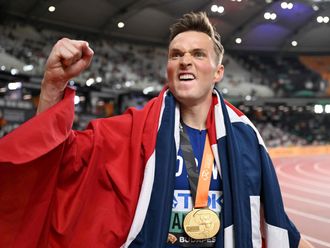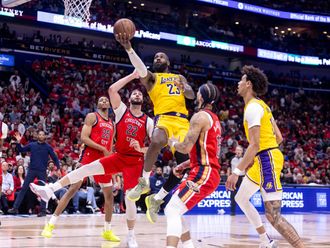
Dubai: Last Friday’s Groves-Smith fight in Jeddah was never about just boxing — it was the world’s first glimpse at a new Saudi Arabia.
We’ve all heard about social reforms occurring under Saudi Crown Prince Mohammad Bin Salman, but nothing makes it more tangible than holding a major international sporting event there — the first of many planned as part of Vision 2030 to diversify the economy away from its dependency on oil and into tourism.
A by-product of this is the easing of conservatism, which in turn improves quality of life.
“There was no way a year ago that females and men would be in the same stadium sitting together in a sports event,” said Halah Al Hamrani, founder of Flagboxing, Saudi’s first female boxing gym.
“Females weren’t even allowed into a sports event a year ago, that’s one thing. I drove myself to the arena, that’s another. I feel like the country has transformed immensely in such a short period of time and I pray to God that the transformation continues.”
Fadi Al Tal, who runs a blog called BoxingArabia, agreed: “Everybody is loving this, we are seeing Saudi changing in many ways. It’s really good and if you look at the demographics it’s a very young nation (60 per cent are under the age of 21 according to a 2012 estimate from The Economist) and this will open up for a very bright future.”
Jeddah is said to be more liberal than the capital Riyadh, but Riyadh beat Jeddah to the opening of the country’s first cinema this summer. There was even an electronic trance concert there last week as part of the country’s 88th National Day Celebrations. (Both music and film were previously banned).
“What’s impressive about this country is that there’s a feeling of change,” French musician Jean-Michel Jarre told Al Arabiya after the concert. “It makes me think about China in the nineties. I went a few times over the last few weeks and each time it’s evolving, it’s different, and you feel such a strong energy from the youth. With Vision 2030, what’s impressive is that all the youth seems to be very involved both in the relationship with environment and new technology, and this concert is all about that.”
Futuristic Saudi’s repositioning to be more sustainable after oil couldn’t be better portrayed than through their hosting of the next big sporting event after boxing, which is the Formula-E season-opener in Riyadh around the Unesco heritage site of Diriyah, on December 15.
Like F1, but for electronic cars, the format speaks volumes of Saudi’s need to champion alternative energy, while attracting tourism.
Unlike boxing, where there was no provision for fan visas, the Saudia Ad Diriyah E-Prix will be the first sporting event to launch an easy online visa platform. Previously you would need an invite to visit Saudi, but now you can get a 14-day e-visa with your race ticket for about Dh650.
Prince Abdul Aziz Bin Turki Al Faisal Al Saud, vice-chairman of the Saudi General Sports Authority, said: “The best way to see Saudi Arabia is to visit through sports, this isn’t just the first way, it’s the best way. I want them to see Saudi Arabia, I want them to meet the people and see who we really are. I’m sure people will have a different point of view when they do.”
Simon Chadwick, a professor from Salford University in England, who specialises in the business of sport in the GCC, said this was the best way for Saudi to open up.
“Sport is an opportunity for Saudi to communicate who it is, what it stands for, what it does, what it aspires to, and what role it wants to play in the world. There is no doubt that, globally, people hold some entrenched pre-conceptions of the country, but investing in sport is an opportunity to begin addressing that.”












